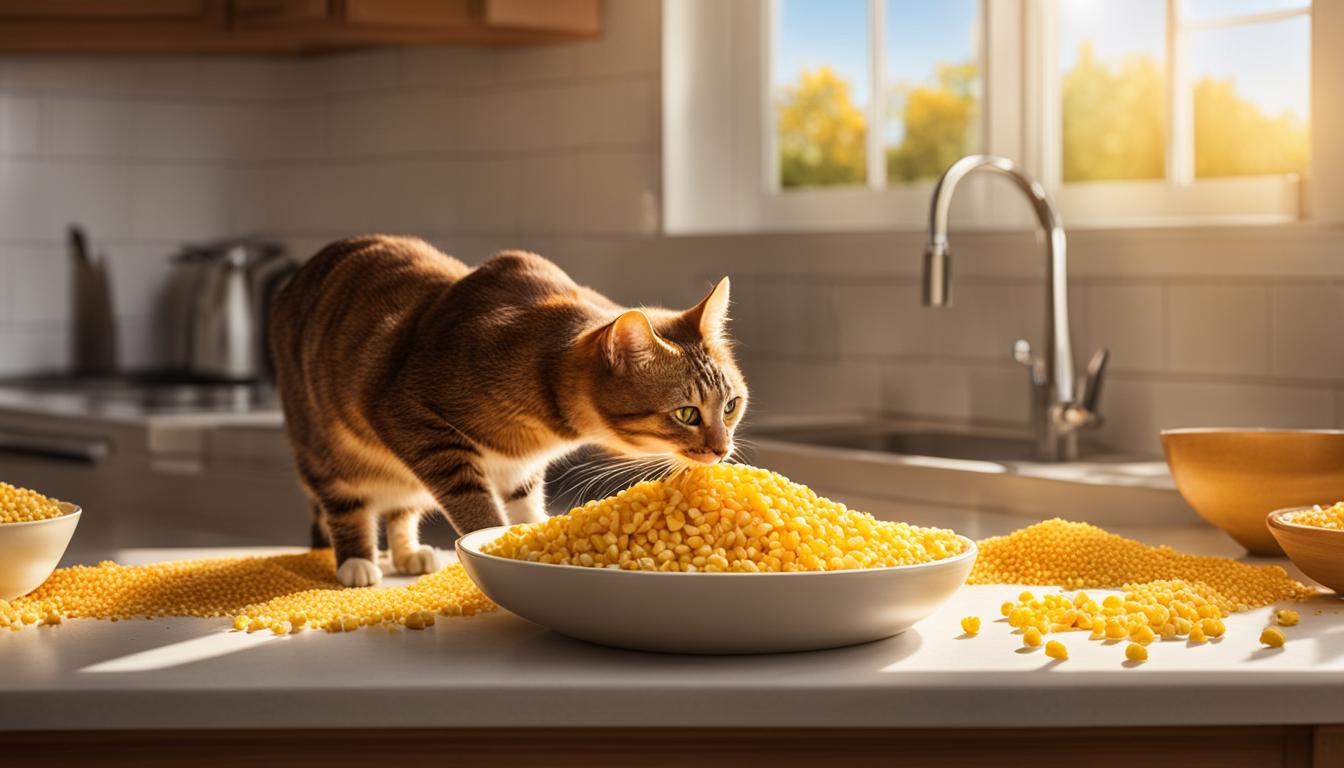Are you wondering if cats can eat corn? The answer is yes, but with some precautions. Let’s dive into the topic of corn and its safety for our feline friends.
Corn is not toxic to cats, so a few kernels can be given as a treat without worry. However, it’s essential to keep corn husks and corn cobs out of their reach as they can cause problems.
High in fiber and carbohydrates, corn can improve stool consistency and provide energy for your cat’s body. It’s not uncommon to find corn as an ingredient in cat foods, yet it should only make up a small percentage of their diet.
It’s crucial to note that cats with diabetes should avoid corn due to its high carbohydrate content. When feeding corn to your cat, make sure it’s cooked plain and not seasoned with butter, salt, onions, or garlic.
In the following sections, we’ll explore the nutritional benefits and risks of corn for cats, as well as provide a conclusion regarding its place in their diet. Stay tuned!
The Nutritional Benefits and Risks of Corn for Cats
Corn can provide cats with various nutritional benefits, but it should be fed in moderation and not as a primary diet. Let’s explore the nutrition facts of corn for cats.
Nutritional Benefits of Corn for Cats
Corn is rich in fiber, providing cats with a healthy digestive system. It is also a good source of carbohydrates, which can offer cats a source of energy. In addition to fiber and carbohydrates, corn contains essential vitamins and minerals such as vitamin C, vitamin B6, lutein, iron, manganese, phosphorous, zinc, and magnesium. These nutrients can contribute to a cat’s overall health and well-being.
However, it’s important to note that corn should only be fed to cats as an occasional treat. A nutritionally balanced cat food should be the primary diet as it provides all the necessary nutrients for cats to thrive. Corn should not exceed 10% of a cat’s daily calorie intake to prevent nutritional deficiencies.
Risks of Corn for Cats
While corn itself is not toxic to cats, certain parts of corn should be avoided. Corn cobs and corn husks can cause intestinal blockages and other gastrointestinal problems if ingested by cats. Therefore, it is crucial to keep corn cobs and husks out of a cat’s reach to prevent any potential health risks.
Conclusion
Cats can enjoy the occasional treat of corn, but it should not make up a significant part of their diet. While corn is not toxic to cats, it is important to remember that a nutritionally balanced cat food should be their primary source of nutrients.
If you decide to give your cat corn, make sure it is cooked plain and without any seasoning. Corn-based snacks and products should be avoided as they may contain additives and seasonings that can be harmful to cats.
It’s worth noting that some cats may have allergies to corn, so keep a close eye on their behavior and any adverse reactions when introducing it into their diet. If you have any concerns or questions, it is always best to consult with your veterinarian before making any significant changes to your cat’s diet.
Remember, the health and well-being of your furry friend should always be a top priority. Enjoy sharing an occasional treat of corn with your cat, but make sure their overall diet is well-balanced and tailored to their specific nutritional needs.
FAQ
Can cats eat corn?
Yes, cats can eat corn, but it should only be given as an occasional treat. Corn husks and corn cobs should be kept out of reach as they can pose problems for cats.
Is corn good for cats?
Corn is high in fiber and carbohydrates, which can improve stool consistency and provide energy for the body. However, it should only make up a small percentage of a cat’s diet and should not exceed 10% of their daily calorie intake.
Can cats with diabetes eat corn?
Cats with diabetes should avoid corn due to its high carbohydrate content. It is best to consult with a veterinarian for suitable dietary options for diabetic cats.
What nutrients are in corn?
Corn is high in fiber, carbohydrates, vitamin C, vitamin B6, lutein, iron, manganese, phosphorous, zinc, and magnesium. While these nutrients can be beneficial for cats, corn should only be fed as an occasional treat.
Can cats be allergic to corn?
Some cats may be allergic to corn, so careful observation is necessary when introducing it into their diet. If you suspect an allergy, consult with a veterinarian for appropriate dietary recommendations.
Should I feed my cat corn-based snacks and products?
It is best to avoid giving your cat corn-based snacks and products due to the potential for harmful additives and seasonings. Stick to natural corn cooked plain without butter, salt, onions, or garlic as an occasional treat.
Should corn be a significant part of my cat’s diet?
No, corn should not be a significant part of your cat’s diet. A nutritionally balanced cat food should be the primary diet, as it provides all the necessary nutrients for cats to thrive. Corn should only be given in moderation.
Can corn cause intestinal blockages in cats?
Yes, corn cobs and corn husks should be avoided as they can cause intestinal blockages and other gastrointestinal problems in cats. Keep these items out of your cat’s reach.
Should I consult a veterinarian before feeding my cat corn?
Yes, it is always best to consult with a veterinarian before making any significant changes to your cat’s diet, including the introduction of corn. They can provide personalized advice based on your cat’s specific needs and health conditions.
